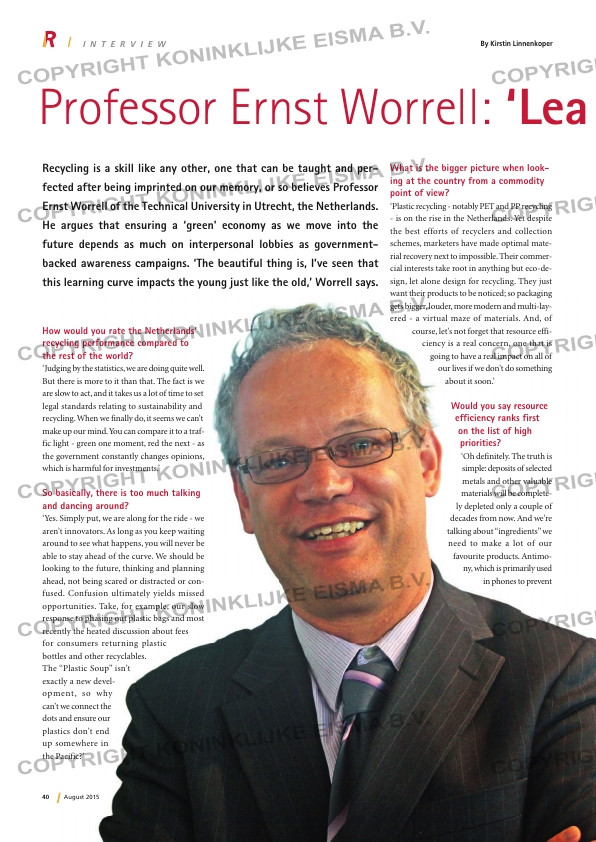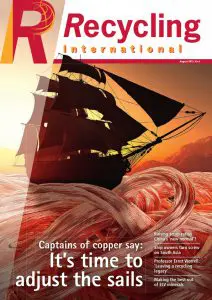Page 40 from: August 2015

40 August 2015
Recycling is a skill like any other, one that can be taught and per-
fected after being imprinted on our memory, or so believes Professor
Ernst Worrell of the Technical University in Utrecht, the Netherlands.
He argues that ensuring a ‘green’ economy as we move into the
future depends as much on interpersonal lobbies as government-
backed awareness campaigns. ‘The beautiful thing is, I’ve seen that
this learning curve impacts the young just like the old,’ Worrell says.
Professor Ernst Worrell: ‘Lea ving a recycling legacy’
I N T E R V I E W By Kirstin Linnenkoper
How would you rate the Netherlands’
recycling performance compared to
the rest of the world?
‘Judging by the statistics, we are doing quite well.
But there is more to it than that. The fact is we
are slow to act, and it takes us a lot of time to set
legal standards relating to sustainability and
recycling. When we finally do, it seems we can’t
make up our mind. You can compare it to a traf-
fic light – green one moment, red the next – as
the government constantly changes opinions,
which is harmful for investments.’
So basically, there is too much talking
and dancing around?
‘Yes. Simply put, we are along for the ride – we
aren’t innovators. As long as you keep waiting
around to see what happens, you will never be
able to stay ahead of the curve. We should be
looking to the future, thinking and planning
ahead, not being scared or distracted or con-
fused. Confusion ultimately yields missed
opportunities. Take, for example, our slow
response to phasing out plastic bags and most
recently the heated discussion about fees
for consumers returning plastic
bottles and other recyclables.
The “Plastic Soup” isn’t
exactly a new devel-
opment, so why
can’t we connect the
dots and ensure our
plastics don’t end
up somewhere in
the Pacific?’
What is the bigger picture when look-
ing at the country from a commodity
point of view?
‘Plastic recycling – notably PET and PP recycling
– is on the rise in the Netherlands. Yet despite
the best efforts of recyclers and collection
schemes, marketers have made optimal mate-
rial recovery next to impossible. Their commer-
cial interests take root in anything but eco-de-
sign, let alone design for recycling. They just
want their products to be noticed; so packaging
gets bigger, louder, more modern and multi-lay-
ered – a virtual maze of materials. And, of
course, let’s not forget that resource effi-
ciency is a real concern, one that is
going to have a real impact on all of
our lives if we don’t do something
about it soon.’
Would you say resource
efficiency ranks first
on the list of high
priorities?
‘Oh definitely. The truth is
simple: deposits of selected
metals and other valuable
materials will be complete-
ly depleted only a couple of
decades from now. And we’re
talking about “ingredients” we
need to make a lot of our
favourite products. Antimo-
ny, which is primarily used
in phones to prevent
RI-6 Interview.indd 40 05-08-15 09:53



